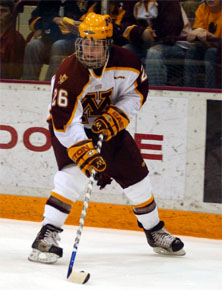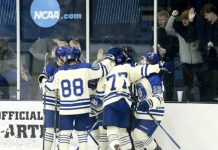Insurmountable No More
Was it just three weeks ago that the race for the MacNaughton Cup seemed academic?
Entering the weekend of Jan. 14-15, Wisconsin held an eight-point lead in the WCHA standings. But that was before the Badgers’ “Black Wednesday,” when goaltender Brian Elliott went down with an injury in practice.
Since then, UW has lost four straight games to Denver and Minnesota, while the Pioneers and the Gophers also won their other intervening games, making the WCHA race a three-way dead heat with eight league games remaining in the regular season for each team.

Based only on the schedule ahead, the Badgers would still seem to be the favorites, with all of its contests against teams in the bottom half of the league standings — though hard-charging St. Cloud State may soon change that.
Denver and Minnesota have tougher roads ahead, including a head-to-head series the weekend of Feb. 17-18. Apart from that, though, the Gophers’ path is similar to the Badgers, with second-division opponents the rest of the way. DU, meanwhile, must take on North Dakota and archrival Colorado College before the first round of the playoffs hit.
Wisconsin, though, will need a shot of confidence to get its bearings back — and part of that will need to be the return of Elliott, still expected to be a couple of weeks away.
Freshman Shane Connelly was thrown to the wolves in his first collegiate duty, performing credibly in his debut against DU (one goal on 23 shots in a 1-0 loss) before giving up three goals or more in each of his next three outings, something Elliott had done just twice all season before going down.
Few would blame Connelly — who was put in a near-impossible situation — for the Badgers’ troubles, not when UW scored just seven goals in front of him in those four games, but Elliott may have proved his value to the Badgers even more effectively by his absence than he had shown when he was on the ice.
Getting It Right
By now, you might already know the facts.
During Friday’s game between Michigan and Michigan State at Munn Arena, Spartan defenseman Ethan Graham launched a blast that passed clean through the Wolverine net. No goal was the eventual ruling on the play, setting off a chain reaction of controversy that still echoes.
If you haven’t read Sean Caruthers’ recap of that game, or Dave Starman’s column detailing what went wrong, check ’em out. But the key point is that instant replay, while available at Munn, didn’t offer referee Steve McInchak a good enough vantage point from which to reverse the on-ice decision.
The reason wasn’t that the right vantage point didn’t exist at all. CSTV broadcast the Friday game, and the network’s cameras clearly showed Graham’s shot to be a goal.
Problem is, McInchak didn’t have access to that shot under the CCHA’s replay rules, which mandate the use of only “official” feeds for review purposes.
“Everyone on the bench knew it was a goal right away,” said MSU coach Rick Comley to the assembled media afterward. “You just saw the net move. I thought (the referee) did all he could. He really took his time, brought the assistant referees in to look at it. Obviously the goal was in, but the replay camera was the only one that didn’t conclusively show that it was in.”
Now, don’t get me wrong. Any replay is better than no replay. But the fact of the matter is that McInchak could have corrected the no-goal with the right TV view, and he wasn’t allowed to do so.
A frequent complaint (one Starman notes as well) about the idea of using TV feeds for instant replay is that it’s somehow unfair to teams that don’t enjoy a lot of television coverage.
That concept, to be frank, is silly. Instant replay isn’t an “advantage” for both teams — it’s only an advantage for one team — the one that gets a call to go its way. It hurts the other team by exactly an equal amount.
In the case of Michigan-MSU, if Graham’s goal had counted the Spartans might have come out of Friday with a win and the Wolverines a loss. That’s one point up for MSU, and one down for Michigan. The effect on every other team in the league? Neutral. Nobody gains, nobody loses.
The job of the officiating crew, at any game in any league, is to get as many calls right as possible. So bring on the TV angles. If they help to fix a mistake, it doesn’t matter how the information is acquired, or from where.
The fundamental issue is fairness, and that means being right as often as possible. If there’s some definition of “fair” out there that requires being wrong to somehow balance the playing field, well, that’s a notion of fairness I want nothing to do with.
PairWise Patter
Not only did St. Cloud jump into the top 20 in the USCHO.com/CSTV Networks poll Monday (at No. 19), the Huskies are suddenly players in the race for the NCAA tournament.
SCSU is 8-1-1 in its last 10 games, vaulting the Huskies onto the NCAA bubble according to the PairWise Rankings, which mimic the NCAA’s selection process for the national tournament. Included in that streak is a 1-0-1 record against ECACHL-leading Colgate, a split with Denver and a stunning road sweep of North Dakota last weekend.
The two wins over UND owed a great deal to the goaltending of Bobby Goepfert, the Providence transfer who now ranks in the nation’s top 10 in both save percentage and goals against average.
Goepfert, who posted a 2.53 GAA and a .918 SV% for the Friars in 2003-04 before sitting out a year after transferring, sports even better numbers in his debut season at SCSU. The Kings Park, N.Y., native is 12-7-3, 2.01, .930 for the Huskies. He allowed just two goals on 66 Fighting Sioux shots last Friday and Saturday to backstop the sweep.
St. Cloud, which made four straight NCAA appearances under former head coach Craig Dahl before backsliding the last two seasons, can give new bench boss Bob Motzko his first dance ticket in his rookie season as a head coach with a strong finish.


